For One Billion Rising 2017, the European Women’s Lobby (EWL) decided to focus on sexual exploitation.
Indeed, OBR2017 was very timely for an advocacy action at EU level. The EU member states are discussing the EU accession to the Istanbul Convention on violence against women (VAW); the European Commission and the European Parliament (EP) are in favour of this accession and needs support; 2017 has been designated EU year of focused actions on VAW. So our action was intended to have a direct impact on the EU developments.
The sexual exploitation of women and girls is a growing phenomenon in Europe, and the European Commission is expected to present its new strategy to end sex trafficking. EWL action aimed at fostering such policy development, which is instrumental to put an end to the exploitation of women and girls.
On 8 March, we participated in the flashmob organised by the European left party, in front of the EP. We had 5 young women visiting the European Parliament on that day, all of them belonging to the EWL network Youth4Abolition, working to raise awareness and end prostitution with a youth perspective. So we kept our focus on sexual exploitation and violence against women.
EWL takes part to GUE Feminist Forum, 6-9 March 2017
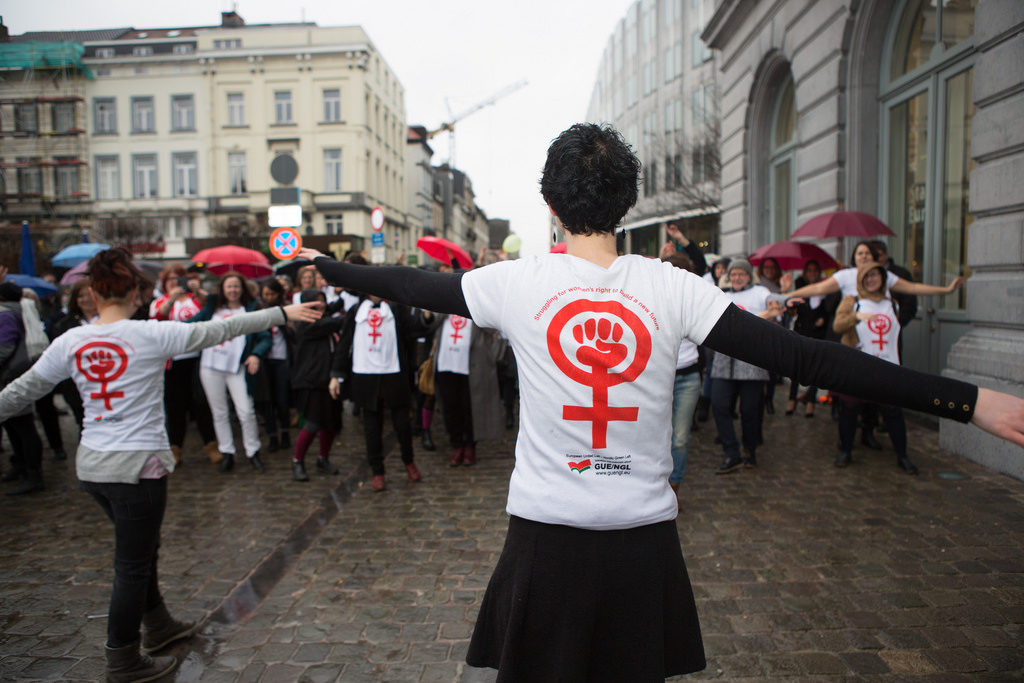
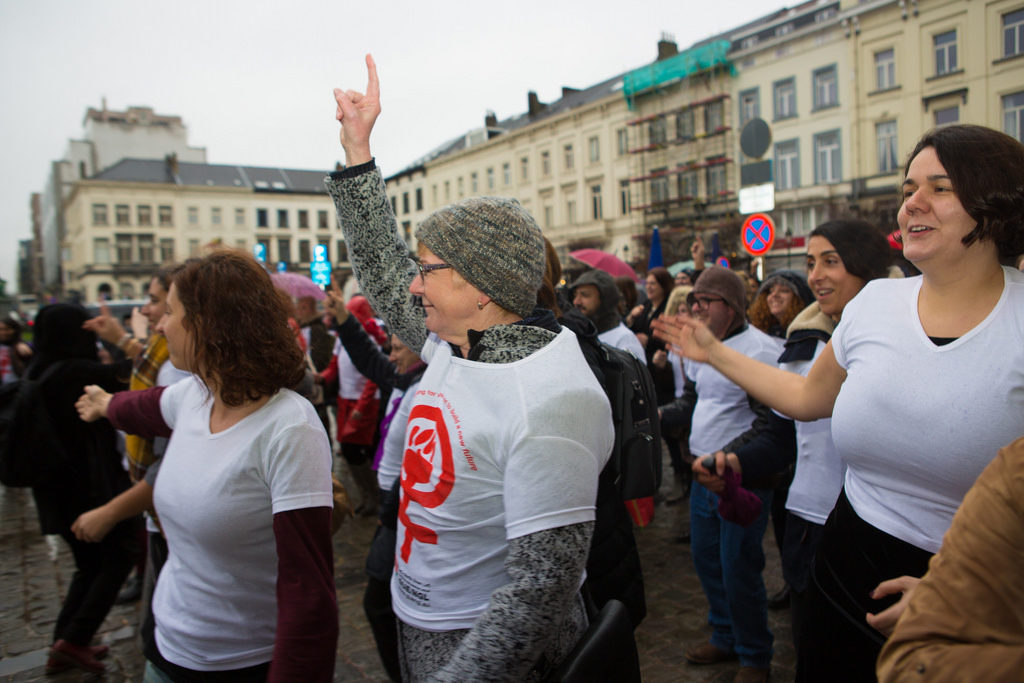
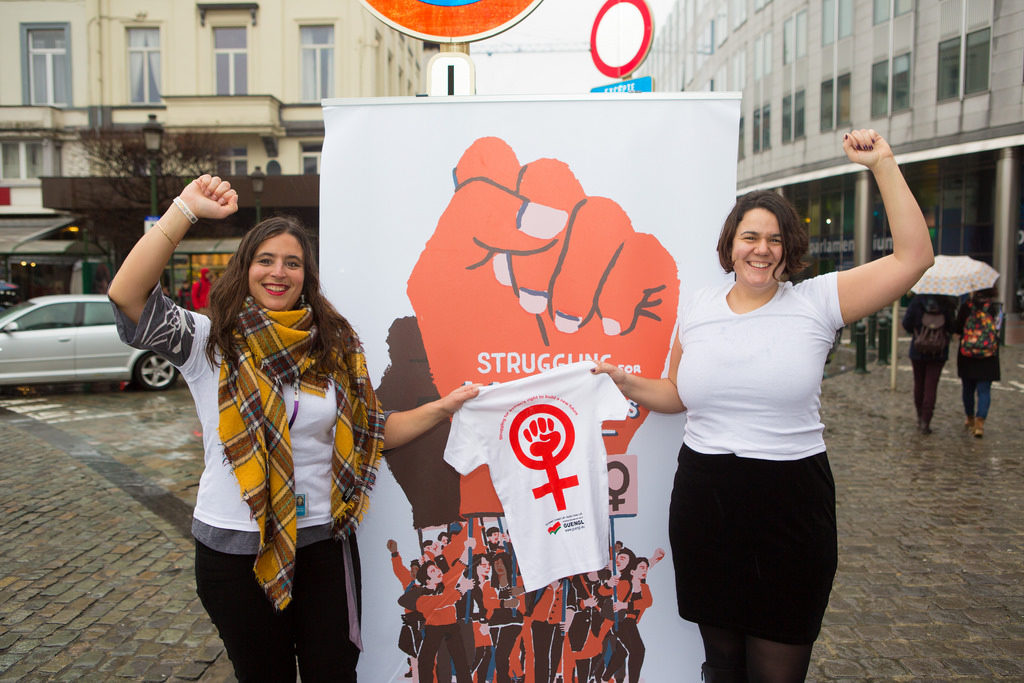
Our OBR action was very visible on social media on 14 February, and the use by our member organisations from all over Europe of our visuals (hand-made) gave unity and strength in the messaging.
Thanks to the 8 March flashmob and our mobilisation for it, the momentum of OBR stayed for one more month.
On 14 February, as we were dancing against violence and celebrating OBR, the Irish decision-makers adopted the Sexual Offences Bill, which provides for a series of measures to end sexual violence, including sexual exploitation and prostitution. OBR was therefore very visible as a symbolic date for such a major step in Ireland for women’s human rights.
OBR 2017 was not without its’ challenges. Generally speaking, women’s organisations face a lot of attacks, both on the rights they promote and fight for, and because of the anti-feminist growing environment they operate in. Many countries face anti-gender and misogynistic speeches and actions, on top of policies aiming at shrinking their space. This year was specifically difficult for many of our member organisations, especially in Eastern Europe. We had to be creative and proposed a social media action
In order to prepare the visual social media action, we decided to create ourselves the visuals and messages for the social media action, so that women’s creativity is fostered (instead of a traditional social media visual made out of typical internet pictures/icons…). We organised an artistic workshop and convened an online brainstorming session on messaging around the topic of of OBR: “solidarity against exploitation of women”.
The artistic workshop took place on 24 January in Brussels, with EWL staff members. After we all expressed our vision of solidarity and of ending sexual exploitation, we started transforming our feelings into art, using OBR logo as inspiration, as well as the recent global developments (the women’s marches on 20-21 January). The outcomes show: women’s creativity, diversity and colors, togetherness, strength and readiness for action!
We also wanted to design our own slogans, and asked the EWL network of young people Youth 4 Abolition to come up with hashtags and slogans. Youth 4 Abolition is a European-wide network of youth organisations dedicated to tackling prostitution and sexual exploitation. We believe that the voice of young people needs to be heard on the issue of prostitution, as the legislative choices made by governments on prostitution have an impact on the values and the society we want, and specifically directly on young people, on their ability to choose not to be in prostitution and to live a decent life. We believe young people should be part of the conversation towards a world free from prostitution and sexual exploitation.
Rising against the sexual exploitation of women & girls #1billionrising
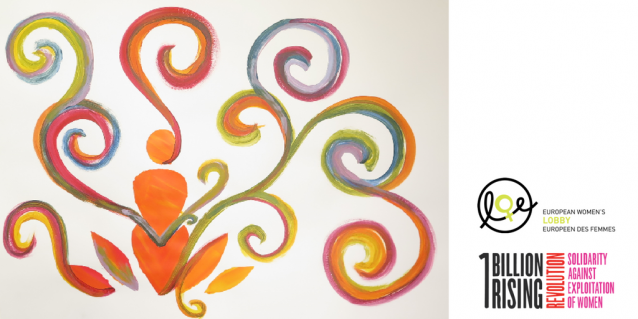
We shared our visuals on our website, and sent them to all our members, so that they could use them. Some EWL members at national level were very creative in using the visuals: they adapted them (showing great technical skills) with their own messages and slogans.
We also shared them with the European Coalition to end violence against women and girls, a coalition of more than 25 European Networks, including organisations working on/with persons with disabilities, homelessness, undocumented migrants and migrant women, men for equality, LGBTQ, trade unions, etc.
The EWL youth network was also actively involved in creating slogans, in participating in the flash mobs, and in disseminating our social media visuals.
Empowering days in the European Parliament – Youth for Abolition blog post by Abbie Osmond
Many EWL members also took part, from grassroots to advocacy groups, to artists, etc.

One of the best feedback we’ve had from our members was the importance of rising together, of keeping the issue on the agenda, of calling for change. Our members were very supportive, used our visuals and messages, and organised their events, according to their context and needs. The topic of exploitation was timely as EWL membership is very active working towards the abolition of prostitution. Having OBR as a regular ‘meeting’ each year is useful to strategize around it, as part of our broader campaign to end VAW in Europe.
2017 is the Year on VAW, so OBR was very good as part of a series of actions towards our goal: the ratification by the EU of Istanbul Convention, and hopefully one day an EU directive on VAW. We strongly believe that OBR 2017 helped us in our campaign.
We were able to mobilise the European networks with whom we have built a coalition to ask for the EU ratification of the Istanbul Convention. Several of these networks used our social media visuals too (such networks are for example the European Network of Migrant Women, the Social Platform, the European Disability Forum, the EndFGM network, etc.)
Violence against women and girls: will Europe rise up in 2017?
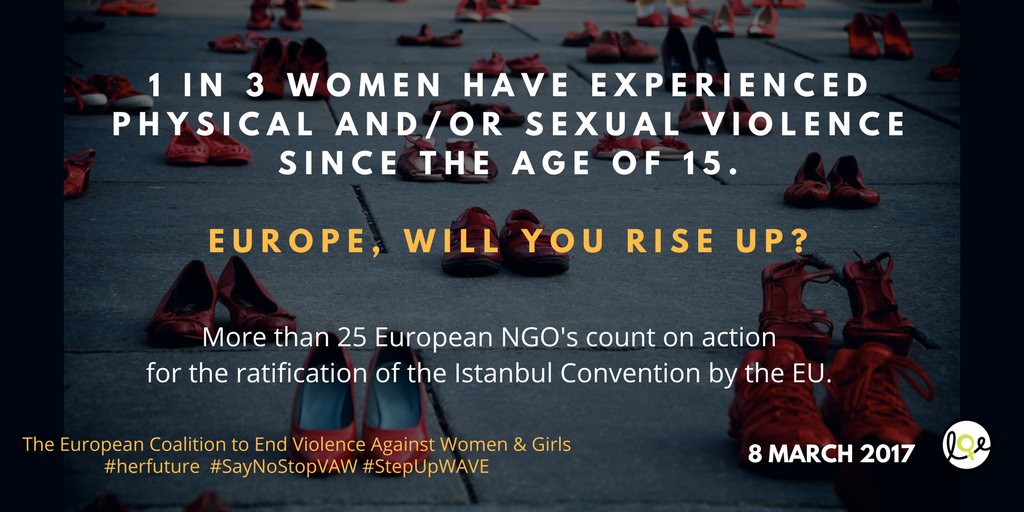
In our campaign to end VAW, we are struggling with the persistent male entitlement to women’s bodies and the patriarchal mentality which normalise male violence as a way for our society to function. We face a lack of long-term interest of decision-makers to tackle male violence, not only because politics is male-dominated, but also because VAW is a profoundly rooted phenomenon which requires long-term action and political courage. It’s about dismantling male privilege and changing mentalities.
We see backlash in many countries against policies to end VAW: change of legislation to go back to VAW as a private issue, not a societal issue; where impunity is still prevalent and sometimes growing; lack of support services for women and of access to justice; new forms of VAW such as revenge porn and cyberviolence, with no public response to counter them.
In Europe, we don’t have a harmonised policy and therefore women are not equally protected. We are campaigning around the idea that Violence against women is a European issue. Maybe the next OBR could be around a global call to stop violence, on the basis of examples of huge discrepancies from one country to another. Another idea could be to focus on a specific form of violence, such as rape, or marital rape. Rape is so prevalent that it is a forgotten issue. It takes many different forms, but the consequences are the same. And the perpetrators are often invisible.
A very recent Eurobarometer found out that today, 1 in 5 persons in Europe blame the victim. 1 in 5 persons in Europe think that male violence is provoked by the victim or that women often make up or exaggerate claims of abuse or rape. 27% of Europeans think that rape can be justified in some circumstances. This figures goes up to 40-50% in countries like Belgium and Romania.
OBR could focus on shifting the blame, from the victim to the perpetrator, in order to be more provocative and shake people’s beliefs. Another form of violence that could be addressed is cyberviolence. Also, violence against girls and young women is often invisible, not spoken about and not politicized.
We believe many of our members are willing to organise OBR every year, as an opportunity to maintain VAW on the political agenda, to mobilise their constituency/members, to propose a creative and festive time to do activism together. We also believe it is important to have a focus on VAW at European level linked to the global OBR movement, to make sure that we take stock of the progress and call for more action.